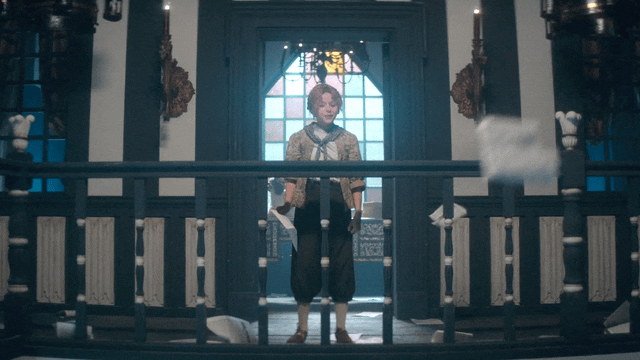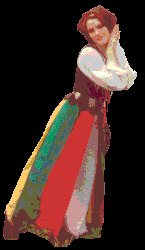#lady eularia
Text




#louisa harland#nell jackson#alice kremelberg#sofia wilmot#joely richardson#lady eularia#florence keen#george jackson#renegade nell#gif
54 notes
·
View notes
Text
youtube
Renegade Nell Trailer
Nell Jackson is framed for murder and has to go on the run, becoming a notorious outlaw in 18th century England. She does have a little help, though, from a magical spirit called Billy Blind.
Renegade Nell is written and created by Sally Wainwright. The series stars Louisa Harland (Nell Jackson), Frank Dillane (Charles Devereux), Alice Kemelberg (Sofia Wilmot), Ényì Okoronkwo (Rasselas), Jake Dunn (Thomas Blancheford), Bo Bragason (Roxy Trotter), Florence Keen (George Trotter), Nick Mohammed (Billy Blind), Joely Richardson (Lady Eularia Moggerhangar), Adrian Lester (Robert Hennessey), Pip Torrens (Lord Blancheford), and Craig Parkinson (Sam Trotter).
Renegade Nell lands on Disney+ on March 29, 2024.
#renegade nell#sally wainwright#louisa harland#frank dillane#alice kemelberg#enyi okoronkwo#jake dunn#bo bragason#florence keen#nick mohammed#joely richardson#adrian lester#pip torrens#craig parkinson#disney+#TGCLiz#Youtube
14 notes
·
View notes
Text
3 notes
·
View notes
Link

Character Name
The Innamorati (Lovers Class)
(The characters of Isabella, Lelio, Flavio and Vittoria are all part of the Innamorati. However since there are so many more Commedia dell'arte characters that are part of this same class that are not fully developed by Commedia dell'Carte, we gave them their own "catch all" page to include research on this vital class of commedia characters that may not be specific to the four characters listed above. If you are seeking general information on the Innamorati, but sure to consult the web pages of the afore mentioned characters as well.)
In Italian, the Lovers (of whom four-two would-be pairs - are usually needed for a full scenario) are called innamorati. The males have names such as Silvio, Fabrizio, Aurelio, Orazio, Ottavio, Ortensio, Lelio, Leandro, Cinzio, Florindo, Lindoro, etc.; the females: Isabella, Angelica, Eularia, Flaminia, Vittoria, Silvia, Lavinia, Ortensia, Aurelia, etc. - Rudlin
Whether their names are Flavio, Ottavio, Orazio, Silvio, Leandro or Cinthio del Sole; Federigo, Lelio, Mario, or Fulvio - all reveal a fatal trace of fatuity. - Duchartre
Status
High, but brought low by the hopelessness of their infatuation. -Rudlin
Costume
The latest fashion. Males sometimes dressed as young soldiers or cadets. Wigs. Actresses would show off their wardrobe in the better companies by changing costume several times during the course of the action. -Rudlin
They had no particular costume, but dressed in the latest fashion of the period to which they belonged. - Duchartre
Wore stunning silk dresses, often in antique Renaissance style with necklaces of gold and pearls. - Gordon
Gentry-class dress, nice looking, modest, cute. Usually with a heart motif -Little
Origin (History)
The aristocracy of the Italian Renaissance courts amused themselves with a form they called commedia erudita based on the plays of Terence and Plautus, for example Calandria by Cardinal Bibbiena which, like Shakespeare's later Comedy of Errors, is based on Plautus' Menaechmi. As the professional improvised comedy looked to extend its range it seemed to have borrowed the Lovers from the amateur form. - Rudlin
The most prominent Isabella, Isabella Andreini, belonged to the troupe of Gelosi. - Laver
Physical Appearance
Had to be young, well set up, courteous, gallant even to the point of affectation - in short, a blade and a dandy. - Duchartre
Young and attractive – Rudlin
The lovers and wooers of the Commedia dell'arte were always dapper and engaging and just a trifle ridiculous. - Duchartre
Mask
No actual mask, but heavy make-up. Mascara and beauty spots for both sexes. The make-up in fact becomes a mask enabling performers to play the role well into middle age, or even beyond - Giovan Battista Andreini, son of Francesco, played Lelio until he was 73. Vizard or loup could be worn for disguise, usually made of black velvet. This was a normal accoutrement for society ladies when walking to a rendezvous and could be half- or full-face. But since it has not expression it does not count as a mask in the Commedia sense, although it does provide plenty of plot potential, enabling, for example, Columbina to attend rendezvous in her mistress's place. - Rudlin
Occasionally wore a mask that just covered eyes or a loop mask. - Laver
Signature Props
Handkerchief. Posy. Fan for women. -Rudlin
Stance
They lack firm contact with the earth. Feet invariably in ballet positions, creating an inverted cone. Chest and heart heavy. They are full of breath, but then take little pants on top. Sometimes when situations become too much for them, they deflate totally. – Rudlin
Always very proud.
Walk
They do not walk as much as tweeter, due to the instability of their base. First the head leans the other way to the body sway. Then the arms have to be used, one above the other, as a counterweight. -Rudlin
Poses
Various depending on individual character.
Movements
Actors would use the same dancing masters as the well-to-do whom they were parodying in order to point up the ridiculousness of exaggerated deportment. Movement comes at the point of overbalance leading to a sideways rush towards a new focus, with the arms left trailing behind. Stop at the new point (usually the beloved or some token thereof) before (almost) touching it. The Lovers have little or no physical contact. When there is any, the minimum has maximum effect. - Rudlin
Exaggerated movements of the hands, like feathers flapping in the wind. -Fletcher
Gestures
Often while holding a handkerchief or flower, etc. in the leading hand. The arms never make identical shapes. Because of their vanity, they frequently look in a hand mirror, only to become upset by any minor imperfection which is discovered. Even in extremis they are always looking to see if a ribbon or a sequin is out of place. A button found on the floor or a blemish in the coiffure equals disaster. - Rudlin
Speech Language
Tuscan, making great display of courtly words and baroque metaphors. Well read, knowing large extracts of poems by heart (especially Petrarch). They speak softly in musical sentences - in contrast with the zanni. Their sentences are often flamboyant, hyperbolical, full of amorous rhetoric. By the end of the 17th Century in Paris, the Lovers spoke French. - Rudlin
Animal
Various depending on individual character.
Relationships

They relate exclusively to themselves - they are in love with themselves being in love. The last person they actually relate to in the course of the action is often the beloved. When they do meet they have great difficulty in communicating with each other (usually because of the nerves). And they relate to their servants only in terms of pleading for help. The Lovers love each other, yet are more preoccupied with being seen as lovers, undergoing all the hardships of being in such a plight, than with actual fulfilment. Consequently they frequently scorn each other and feign mild hatred; they rebut, despair, reconcile, but eventually end up marrying in the way of true love when the game is up and they know they cannot play any more. After a quarrel the male may try a serenade to win back favour. This will be (dis)organized by Zanni: he employs musicians who are drunk or spends the money on something else and has tu use tramps off the street. The result is total chaos, but in the end the serenade is beautifully played and sung because everyone miraculously turns out to be good at their job after all. - Rudlin
Relationship to Audience
Extremely aware of being watched. Play with the audience for sympathy in their plight. Occasionally flirts with spectators. -Rudlin
Frequent Plot Function
Indispensable. Without them and their inability to resolve their own problems, there would be no function for the zanni, no struggle between the ineffectuality of youth and the implacability of age. The lovers are never alone on stage - they always have someone with them or spying on them. - Ruldin
Their function was to depict a state of mind rather than to paint a personality. - Duchartre
Characteristics
Thought their protestations would melt a heart of stone, there always seems to be a comic side to everything they say. One wonders if the explanation does not lie in the fact that love often robs the lover of all sense of his or her own absurdity, even though he or she may be the most rational of living men or women under ordinary circumstances.
Whatever the names of the lovers in the commedia dell'arte, they had no other trait as 'characters' than that of being in love. - Duchartre
Three, like primary colors: fidelity, jealously and fickleness. They are vain, petuluant, spoilt, full of doubt and have very little patience. They have a masochistic enjoyment of enforced seperation because it enables them to dramatize their situation, lament, moan, send messages, etc. When the Lovers do meet they are almost always tongue-tied and need interpreters (i.e. a zanni and/or a servetta) who proceed to misinterpret their statements, either through stupidity (Zanni), malicious desire for revenge (Brighella) or calculated self-interest (Columbina). Their attention span is short like young children’s. The fear that they might be nobodies keeps them hyper-animated. Their element is water: they are very wet creatures indeed. The females are more passion-wrought and energetic than their male counterparts.
The lovers exist very much in their own world- and in their own world within that world. Self-obsessed and very selfish, they are more interested in what they are saying themselves and how it sounds than in what the beloved is saying. They are primarily in love with themselves, secondarily in love with love, and only consequentially in love with the beloved. What they learn, if anything, from the tribulations of the scenario is the need to reverse these priorities.
They do, however, come off better than most other Commedia characters: there is no viciousness in them, and less to be reproached for – except vanity and vapidness, which, given their parents, they can hardly be blamed for. They represent the human portential for happiness. – Rudlin
The lover had to play with dash and be able to simulate the most exaggerated passion. - Duchartre
“If then true lovers have ever been crossed
It stands as an edict in destiny.
Then let us teach our trial patience,
Because it is a customary cross,
As due to love as thoughts, and dreams, and sighs,
Wishes, and tears – poor fancy’s followers.”
Shakespeare

8 notes
·
View notes